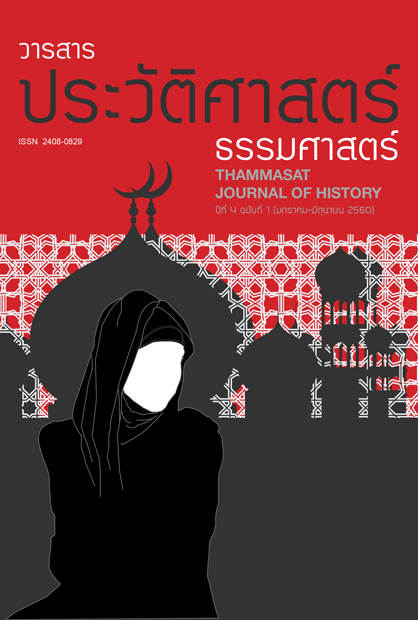Hannah Arendt นักสันติวิธีสตรีที่ไม่สตรีนิยมแต่เสรีนิยมในสงครามเย็น
Main Article Content
บทคัดย่อ
บทความนี้ตั้งใจนำเสนอและการนิยามให้ความหมายของสันติวิธีและความรุนแรงในมิติการเมืองการปกครองของ Hannah Arendt เพื่อชี้ให้เห็นถึงแนวความคิดของเธอที่สามารถนำมาใช้สนับสนุนค่ายโลกเสรีและต่อต้านโลกสังคมนิยม ไปจนถึงความสอดคล้องกับกลุ่มสตรีนิยมภายในแนวคิดทฤษฎีของเธอ
Article Details
ลิขสิทธิ์บทความเป็นของผู้เขียนและสงวนสิทธิ์ตามกฎหมาย
ข้อคิดเห็นใดๆ ที่ปรากฏในวารสารนี้เป็นของผู้เขียน คณะกรรมการวารสาร ภาควิชาประวัติศาสตร์ฯ กองบรรณาธิการ ตลอดจนกรรมการกลั่นกรองประจำฉบับ ไม่จำเป็นต้องเห็นพ้องกับข้อคิดเห็นเหล่านั้น
เอกสารอ้างอิง
The Origins of Totalitarianism. New York: Harcourt, Brace, 1951.
The Human Condition. Chicago: University of Chicago Press, 1958.
On Revolution. New York: Viking, 1963.
Between Past and Future: Six Eexercises in Political Thought. New York: Viking, 1968.
On Violence. New York: Harcourt, 1970.
ชัยวัฒน์ สถาอานันท์. ท้าทายทางเลือก: ความรุนแรงและการไม่ใช้ความรุนแรง. กรุงเทพฯ: ของเรา, 2557.
วารุณี ภูริสินสิทธิ์. สตรีนิยม: ขบวนการและแนวคิดทางสังคมแห่งศตวรรษที่ 20. กรุงเทพฯ: โครงการจัดพิมพ์คบไฟ, 2545.
Bessieres, Yves, and Niedzwiecki, Patricia. Women in the French Revolution (1789) Bibliography. Brussels: Institute for the Development of the European Cultural Area, 1991.
Bolt, Christine. The Women’s Movements in the United States and Britain from the 1790s to the 1920s. New York: Harvester Wheatsheaf, 1993.
Dicker, Rory. A history of U.S. feminisms. Berkeley, Calif.: Seal Press, c2008.
Dietz, Mary G. “Feminist receptions of Hannah Arendt.” In Feminist interpretations of Hannah Arendt, edited by Bonnie Honig. University Park: Pennsylvania State University Press, 1995.
Freedman, Jane. Feminism. Buckingham: Open University Press, 2001.
Gamble, Sarah, ed. The Icon Critical Dictionary of Feminism and Postfeminism. Trumpington: Icon, 1999.
Graham, Ruth. “Loaves and Liberty: Women in the French Revolution.” in Bridenthal, Renate, and Koonz, Claudia. Becoming Visible: Women in European History. Boston: Houghton Mifflin, 1977.
Gitlin, Todd. “The Left’s Lost Universalism.” In Politics at the Turn of the Century. edited by Arthur M. Melzer, Jerry Weinberger and M. Richard Zinman. 3–26. New York: Rowman & Littlefield, 2001.
Hertz, Deborah. 1984. “Hannah Arendt’s RahelVarnhagen.” In German women in the nineteenth century: A social history. edited by J. C. Fout. New York: Holmes and Meier.
Hobsbawm, Eric. The Age of Revolution 1789-1848. New York: Vintage, 1996.
Honig, Bonnie, ed. Feminist interpretations of Hannah Arendt. University Park, Pa.: Pennsylvania State University Press, 1995.
Humm, Maggie. The Dictionary of Feminist Theory. Hertfordshire: Prentice Hall. Harvester Wheatsheaf, 1995.
Kourany, Janet A., Sterba, James P. and Tong, Rosemarie. Feminist Philosophies: Problems, Theories, and Applications. Englewood Cliffs, N.J.: Prentice Hall, c1992.
Mouillaud-Fraisse, Genevieve, Perrot, Michelle., Duby, Georges., Perrot, Michelle. A History of Women in the West. IV, Emerging Feminism from Revolution to World War. Cambridge, Mass.: Belknap Press of Harvard University Press, 1993.
Pitkin, Hanna F. “Conformism, Housekeeping, and the Attack of the Blob: The origin of Hannah Arendt’s Concept of the Social.” In Feminist Interpretations of Hannah Arendt. edited by Bonnie Honig. University Park: Pennsylvania State University Press, 1995.
Sen, Amartya. Identity and Violence: The Illusion of Destiny. New York: W.W. Norton, c2006.
Tong, Rosemarie. Feminist Thought: a Comprehensive Introduction. London: Routledge, 1992.
Tuana, Nancy,and Tong, Rosemarie, eds. Feminism and Philosophy: Essential Readings in Theory, Reinterpretation, and Application. Boulder, Colo.: Westview Press, 1995.
Abray, Jane. “Feminism in the French Revolution.” The American Historical Review 80, no. 1 (February, 1975): 43-62.
Benhabib, Seyla. “Feminist Theory and Hannah Arendt’s Concept of Public Space.” History of the Human Sciences 6, no.2 (1993): 97-114.
Breen, Keith. “Violence and Power A Critique of Hannah Arendt on the ‘Political’.” Philosophy Social Criticism 33, no 3 (2007): 343–372.
Cutting-Gray, Joanne. “Hannah Arendt, Feminism, and the Politics of Slterity: “What will we lose if we win?.” Hypatia 8, no.1 (1993): 35.
Finlay, Christopher J.. “Hannah Arendt’s Critique of Violence.” Thesis Eleven, No. 97 (May 2009): 26–45.
Hall, Stuart. “Life and Times of the First New Left.” New Left Review 61 (January–February 2010).
Martin, Wendy. “Women in the American Revolution.” Early American Literature, 11 (1976/1977): 322-335.
Maslin, Kimberly. “The Gender-Neutral Feminism of Hannah Arendt.” Hypatia 28, no. 3 (Summer 2013): 585-601.
Moyn, Samuel. “Hannah Arendt on the Secular.” New German Critique, Political Theology, No. 105 (Fall, 2008): 71-96.
Racz, Elizabeth. “The Women’s Rights Movement in the French Revolution.” Science & Society 16, no.2 (Spring, 1952): 151-174.
Rose, R. B.. “Feminism, Women and the French Revolution.” Historical Reflections / RéflexionsHistoriques 21, no.1 (Winter, 1995): 187-205.
Shepherd, John. “Eric Hobsbawm, 1917-2012.” Labour History, no. 104 (May 2013): 221-224.
Suchting, W. A.. “Marx and Hannah Arendt’s The Human Condition.” Ethics 73, no. 1 (Oct., 1962): 47-55.
Veltman, Andrea. “Simone de Beauvoir and Hannah Arendt on Labor.” Hypatia 25, no. 1 (Winter, 2010): 55-78.
Villa, Dana. “Hannah Arendt, 1906-1975.” The Review of Politics, Political Philosophy in the Twentieth Century 71, no. 1 (Winter 2009): 20-36.
Arendt, Hannah “Zur Person” Full Interview. Published on Apr 8, 2013, https://www.youtube.com/watch?v=dsoImQfVsO4.
Kohn, Jerome. The World of Hannah Arendt. Three Essays: The Role of Experience in Hannah Arendt’s Political Thought.The Library of Congress, http://memory.loc.gov/ammem/arendthtml/special.html.


